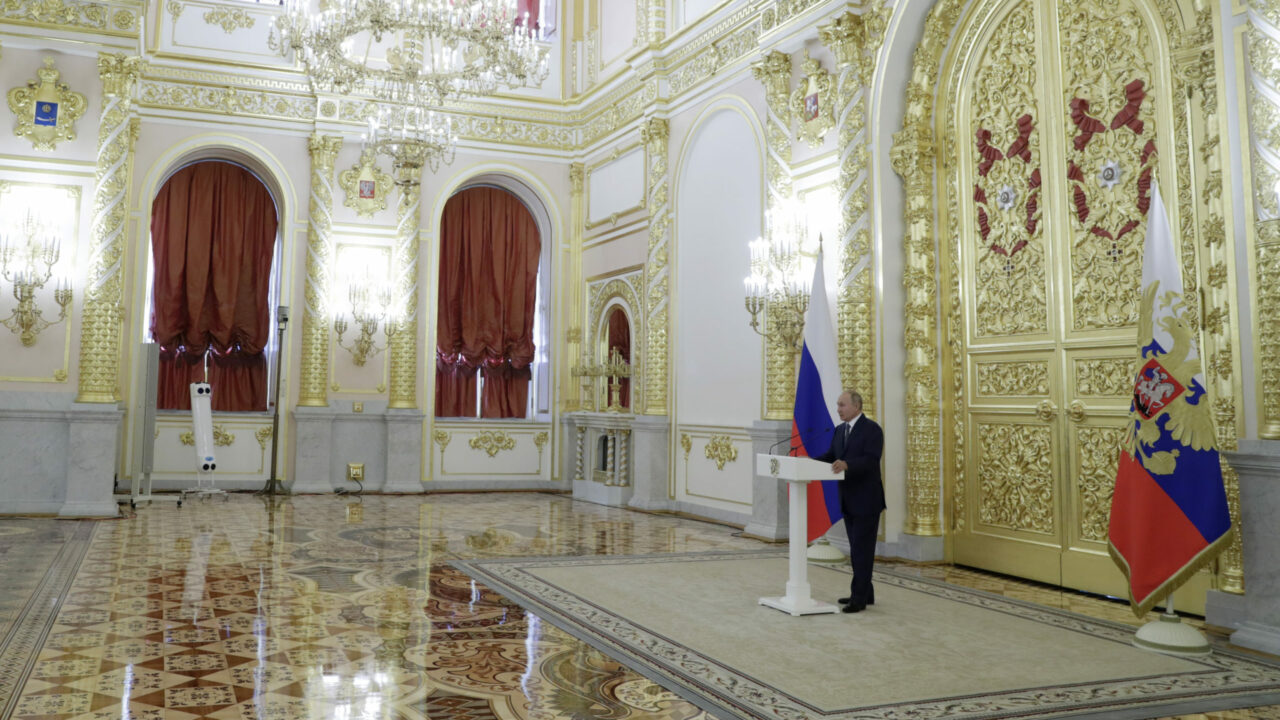The trouble with unchecked power: Why Putin will never leave
If he had thoughts of leaving the Kremlin prior to the Navalny assassination attempt, Vladimir Putin likely now sees no exit for himself
Last year Russia held a referendum on constitutional reform, whose provisions the regime had intended to enable an orderly transition for Vladimir Putin at some point in the future. But the reform ended up being little more than a nullification of the number of presidential terms Putin can serve. Experts have explained such an obvious trick by suggesting the president was unwilling to be a ‘lame duck’ in the eyes of society and political elites several years before the end of his term. At the same time, the chances were that he was going to leave after 2024. Recent events in Russia, most likely, now leave no alternative to his endless rule.
In just a few years, Putin’s image among Russia citizens has slipped from one of “strong, just national leader” to an association with corruption and a love of luxury. Accusations of his personal involvement in last year’s attempted assassination of Alexei Navalny leave him no chance of a safe post-presidential future. It is unlikely that lifelong immunity from prosecution in Russia or security provided by the Federal Protective Service – or, for example, a symbolic post in parliament – will give him much sense of personal security. Putin knows the price of the rule of law in his country like no one else. He also knows very well where the loss of real leverage can lead.
In such conditions, a transfer of power even to one of Putin’s most loyal followers has become extremely unlikely. Any such replacement will inherit the same unlimited powers that the president of Russia now enjoys, meaning they could eventually turn on their predecessor. Trying to control the new president would be too risky. Uncharismatic and loyal Dmitry Medvedev during his short presidency periodically showed excessive independence – and that was even while Putin still basked in tremendous support from the public and remained the true leader in their eyes.
Now Putin’s rating is at a long-time low and a train of unpleasant stories has stuck to him that he cannot shake off. And he has neither the resources nor the bold ideas on how to regain people’s former love for him. Therefore, any successor to Putin will sooner or later be tempted to distance themselves from him as much as possible – meaning they will not be under his control or influence.
The well-oiled authoritarian system of retaining power, built by Putin, has turned its creator into its hostage.
But, even if we assume that Putin can secure a cast-iron guarantee of immunity and comfortable life in retirement, who would still protect him should Russia’s political system – perhaps more fragile than it looks – enables his ideological opponents to come to power?
A glance across the post-Soviet space reveals many examples of once-beloved national leaders ending up behind bars. In Kyrgyzstan, President Almazbek Atambayev agreed to transfer power to an associate – and soon found himself in prison. In Armenia, former president Robert Kocharian was arrested after the people’s revolution of 2018, even though he had left office 10 years earlier.
The opposition’s current attempts to organise large-scale street protests in Russia will certainly be causing Putin to reflect on this. As long as he himself controls the power bloc and the nomenklatura, he can be sure that, for the sake of his own salvation, he will be able to use absolutely all resources and give any order he likes. But who knows how the next president will behave in such a situation. The very idea that Putin’s fate could lie in the hands of other people will be deeply unpleasant and unacceptable to him.
The international situation will also push Putin to stay. He is held captive by illusions about a world conspiracy against Russia, about attempts to weaken his country or even dismember it into parts. Eventually, this turns into a vicious circle. Firstly, the Russian authorities have convinced themselves that there are enemies all around. They then begin to behave as though other countries are all enemies. Having received a backlash to these actions, the Russian authorities feel their fears are confirmed: friends would not impose sanctions, and true enemies need to a harsh response.
There are therefore no prospects for detente or real improvement in relations with the West on the horizon. And it is unlikely that in such difficult times for the country, the national leader, who Putin undoubtedly considers himself to be, will be ready to abandon Russia. This means he needs to stay and save the motherland.
The well-oiled authoritarian system of retaining power, built by Putin, has turned its creator into its hostage. As The Little Prince was told, “kings do not own. They reign over.” In this case, the king no longer owns even his life.
The European Council on Foreign Relations does not take collective positions. ECFR publications only represent the views of their individual authors.



